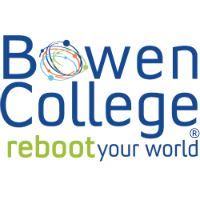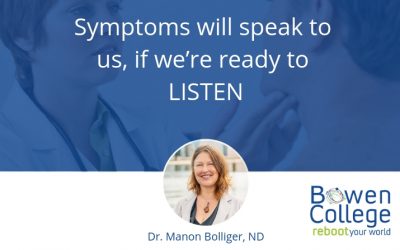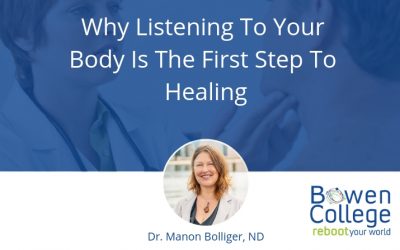News from the Bowen College community
Bowen College is committed to patient-centered, pain-free care. Read news from our community.

Subscribe to the Bowen College blog to read the latest updates for holistic, patient-centered care
Part 2 – Learning Bowen Therapy
The first thing that Brynn Bicknell noticed about her very first Bowen treatment was that she didn’t realize how much pain and tension she was actually in!
Brynn knew she needed to learn more about Bowen Therapy after seeing some incredible results of the therapy on the players of a Junior B Hockey Team in Victoria, so she sought out treatment from the team’s Bowen Therapist.
Part 1 – Healing Concussions with Bowen Therapy
Brynn Bicknell is changing healing in sport. From 14 year old hockey players with big league dreams, to 70 year olds who want to continue playing recreational sports, she has seen a spectrum of patients and admits to using Bowen Therapy in every session.
Understanding Pain Requires Understanding the Mind-Body Connection
Consider the experience of pain: researchers cannot link the lesion/trauma to the degree of perceived pain in a reliable way. Though we may be able to understand some of the neuronal modulations and pathways, we can only surmise the degree of sensitivity felt, and there is a big gap when it comes to “lesional proof.”
Symptoms will speak to us, if we’re ready to LISTEN
The term “prescription” requires exploring the patient-doctor relationship. It should reaffirm the doctor’s purpose, opening up the healing dialogue. My conviction is that the body’s symptoms call upon us to LISTEN: they’re trying to say something.
Getting the Mind-Body Connection Right Provides the Essential Theoretical Framework
If we are looking at the person as a whole, then terminology is important. Emotions deemed “suppressed” are in fact just expressed in another way.
Why Listening To Your Body Is The First Step To Healing
Pain to me is when my brain and intuition are not inline. I call my intuition my soul spot, and when I am not listening to it I get anxiety and pain everywhere. When you are not listening to your body, it becomes painful and everything goes wrong. I can’t just use my brain to think, if I did I wouldn’t be able to heal. Instead, if I connect my brain to my emotions then everything is in harmony.
Patients are not a collection of body parts
Assessment is crucial; it determines the Plan. This is the place and time that we evaluate and make sense of the entire symptomatology. My practice has uniquely positioned me to study and extend understanding of the various aspects that come into play in assessing the patient’s symptoms. The tendency to classify and match diseases with “appropriate” drugs is very limited; the patient’s symptomatology may not always fit neatly within existing categories. Real conditions might not be treated at all or only managed by diminishing or inhibiting symptoms.
Avoiding the Misuses of Objectivity in Healthcare
summarizing how patients deal with their symptomatology, principally their objectives and objections. Solutions, or “prescriptions,” don’t mean anything without a context; thus it is essential to get to the fundamental objectives a patient has and their general objections and misconceptions regarding their health. Patients with a broader definition of health look for treatment and care reflective of their personal attitude towards health.
The Subjective in the SOAP: What We Know about Symptoms
In health, the framework is the point of reference, based on conscious and unconscious extrapolations of possible etiologies and presumed outcomes. It is in the subjective experience of disease, and the underlying assumptions, not the objective findings, in which true assessment and prescription are found. Until those presumptions are clearly expressed and acknowledged by both patient and doctor, there is little support for healing.
Healthcare Has to be Personal to Work
pre-med training, four-year full time study in naturopathic medicine, and seven years of post-graduate training in homeopathic medicine and Bowen therapy, it turned out that none of these paths – in allopathy, naturopathy, homeopathy, physical therapies, or psychological approaches – offered me a clear solution. No stand-alone therapy was complete without my full presence and engagement with it. I had to overcome all my objections and look at my belief system, investigate the operating presumptions before I could “surrender” into any approach at all.
My Experience of “Disease” as a Personal Journey
Today, I am at peace with my health. I have “found myself” on this journey. I am free of scoliosis, tuberculosis, multiple sclerosis, and cancer, and I am living a life full of happiness and gratitude. I have realized that healing is about living life with consciousness and presence. Since 1992 I’ve helped thousands of patients and trained hundreds of students to achieve optimum health and to engage fully in their lives. In the series of posts to come, I’ll share those insights with you.
The New Healthcare Paradigm as Social Justice
Medicine is not the only field experiencing these major shifts of perception. In fact, no field or profession is exempt from its skeptics, philosophers, or innovators. Take the field of law.
Embrace The New Change In Healthcare
In my book, What Patients Don’t Say, If Doctors Don’t Listen, I discussed how the day-to-day challenges of our practices can wear down the initial inspiration to heal for many healthcare professionals. It doesn’t need to be that way, though. There is a new paradigm,...
Are Doctors’ tongue tied?
We become aware that “Dr. Google” has been diagnosing and coming up with solutions — some interesting, some frightening — inspiring a new breed of patient. They nonetheless look to us for solutions, but they often leave with more questions than answers.
How To Understand & Release Trauma
35 women came together to ‘share their stories about being assaulted by Bill Cosby and the culture that wouldn’t listen.’ (NY Times) This represents a turning point on how our society views and understands the different types of trauma that exist. Now, particularly online ‘there is a strong sense that speaking up is the only right thing to do, that a women claiming her own victimhood is more powerful than any other weapon in the fight against rape’(NY Times) and healing from trauma.
Feet Matter!
Next week, I am heading to Calgary to speak at the Health Fusion Conference, about feet! Yes, that’s right. Without them, life would be difficult!. So on Friday, June 26th, at the Hyatt Regency in Calgary, I will be presenting Feet Matter: Simple Solutions for Feet






